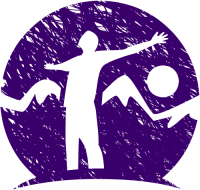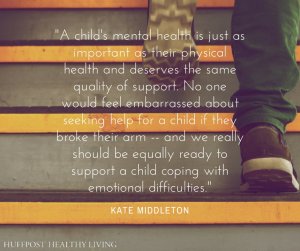There was a an article about mental illnesses and how they are one of those Invisible Diseases and there were many quotes speaking to adults. But, here is one I found for our children suffering with mental issues. I have talked about it before and will bring it up again because we need to learn. Children with chronic illnesses suffer from depression and anxiety at the very least. They need their mental health addressed and evaluated and much as they need a physical or a follow-up after surgery. Our children are not second-hand citizens to be treated as inferior human beings. It is our responsibility as parents to make sure that we are doing everything possible to help them to live the healthiest life possible. Here is a quote from Kate Middleton:



[…] https://iamnotsickboy.com/2015/03/12/you-dont-see-it-but-its-real/ […]
LikeLiked by 1 person
Thank you for the reblog and getting the word out.
LikeLike
Doctors and hospitals are required to assess a patient’s physical pain — that requirement should be expanded to include assessing mental pain. They could even use the 1 to 10 scale that is currently used to indicate pain levels, or something very similar. An easy, visual test, like an eye chart, to give medical providers a place to start the mental health assessment — the beginning of a plan for treatment options, if needed.
However, “experts” claim that all this attention on assessing pain is one of the causes of the opioid “epidemic.” I don’t agree, but you could run into the same push back for including mental health assessments as a requirement.
The other area that needs strengthening is mental health providers in schools. Not just a nurse, but someone trained in suicide prevention. Kids need more opportunities to talk to adults (other than their parents) about their mental health.
LikeLiked by 1 person
You are right, but I think we have to get them to think of mental health when it come to children first. Then we could incorporate. As for a mental assessment at each doctor visit, it would be almost impossible because as a practitioner has 15 minutes per pt. That is how we work. Thank you for your opinions,, it has given me some things to think about.
LikeLike
Patty, thanks for sharing and thanks for stopping by my blog. I wish Alex the best and give courage to you not to give up.
LikeLiked by 2 people
You are so sweet. Thank you. My Alex lost his battle in 2005. He was 30 yrs. old. He is with me everyday encouraging me. ❤️
LikeLiked by 1 person
Thank you for this post—the image you chose is perfect.
LikeLiked by 2 people
Thank you so much. I am glad that you came by to read it.
LikeLiked by 2 people
Always…:)
LikeLiked by 2 people
Yes, parents need to be in tune to more than just physical symptoms. Thank you for bringing more awareness to invisible illnesses x
LikeLiked by 4 people
You are welcome. And Thank you for reading. It is important!
LikeLiked by 2 people
I love Kate’s quote that you used and your excellent post. I too struggle and worry about my children’s mental health. They both have neurological disorders that I advocate for. The sleepless nights and Dr’s appointments are all worth in it in the end to know my son’s are happy, healthy, and whole. ❤️
LikeLiked by 3 people
Isn’t that the truth? We would do anything for our little ones!
LikeLiked by 2 people
It’s so true, I’d fight a pack of lions for my son’s. And when dealing with everything to do with their mental health it’s like fighting Lions for real. ❤️
LikeLiked by 2 people
Yes. I am hoping to make changes in that respect. It seems that they are the most resistant in that area.
LikeLiked by 3 people
Yes it’s so true I’ve been fighting for over a year for my youngest child to get services. Since I’ve moved I found help and am starting to incorporate the resources available in the area. Now I advocate for both of my children and I will fight anyone who stands in my way to them getting help. I’ve had professionals in the medical field talk down to me and I’ve replied I would sitting in your chair had I realized my fascination with neurology 20 years earlier. I read and research as much or more than they do. So I don’t allow anyone in that status to treat me less than. Just me being truthful on top of soap box. Thank you for reading. 😊
LikeLiked by 3 people
We just have to keep stepping up on that soap box!
LikeLiked by 3 people
I agree, thank you so much for your support Patty. 😊
LikeLiked by 2 people
You got it! Come by anytime.
LikeLiked by 1 person
I sure will thank you 😃
LikeLiked by 1 person
A very good point Patty, and it’s something that I often forget to consider. We take for granted that children are emotionally vulnerable, maybe because we expect that they’re not as mentally complex as adults? So short-sighted. Children have even a greater need for mental health, because it’s such a slippery slope once you’re on it…
Great post.
LikeLiked by 3 people
Thank you so much. It feels good when someone truly understands. ❤️
LikeLiked by 3 people
It can be difficult to explain to someone who’s never experienced even an anxiety attack. To those people I often say, “Well, for you to understand how it feels, I need a cricket bat and a cheese grater.” Then they get a bit freaked out and I say, “Okay, imagine being that nervous all the time. Now let’s say I’m following you around with those items and I’m just waiting for you to relax…” Okay, my methods are unconventional, but hopefully I’ve made them a little more aware and sensitive about it.
LikeLiked by 3 people
They’re all the more vulnerable just for being kids. Even healthy ones have trouble communicating pain or discomfort when they’re sick. =(
LikeLiked by 2 people
That is so true.
LikeLiked by 1 person
Thank you! People look at me like I’m nuts for being concerned about my daughter’s mental well being. I have BPD, and my husband is bipolar 2. She’s going to have hereditary issues eventually, I want to catch them as soon as possible, but for some reason that means I’m doing something wrong in the eyes of others. Kids are just tiny humans, no different than adults. I wish more people would understand that.
LikeLiked by 4 people
I totally agree with you. Keep doing what your gut tells you. You know what you are doing.
LikeLiked by 3 people